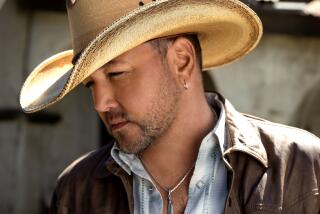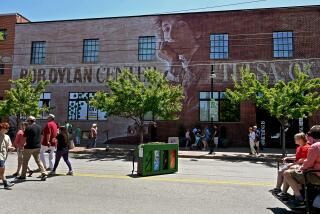Feed store fills aisles with jamming musicians : Amateur bluegrass and country players have become a Saturday tradition at the Acorn Supply Co.
- Share via
COUNCIL BLUFFS, Iowa — If you’re picking up half a ton of hog feed from the Acorn Supply Co. on a Saturday, it’s best to do it before 2 p.m.
Otherwise, you’ll have to hopscotch over speaker wire and maneuver through a maze of beat-up guitar, mandolin and fiddle cases, all to the vibrant strains of such chestnuts as “You Are My Sunshine.”
For more than three hours each Saturday afternoon, Acorn Supply, a dusty old retail store a snowball’s throw from the Union Pacific train tracks, is transported back to another era as bricklayers, housewives, psychologists and retired rail workers come together to pick and sing their favorite bluegrass and country tunes.
Customers stopping in for provisions enter what banjo picker Dick Zion describes as a real-life version of a scene from Garrison Keillor’s mythical hometown, Lake Wobegon, Minn.
“Before radio and TV, people were still social. They’d ride 70 miles, roll up the rugs and play and play and play,” said Zion, who produces a weekly country music radio show in nearby Omaha. “You get people here who are very accomplished and people who are absolute beginners.
“This is a magical place. It’s what it’s all about. It’s the most authentic jam session between Branson, Mo., and the North Pole.”
The informal hoedowns, which attract 30 to 40 pickers and as many spectators, began nine years ago, soon after Dave Fronk, a former hog farmer, opened the feed store with his father, Harry, 64.
The elder Fronk, a lanky man with a boyish glint in his eye, began taking guitar lessons and invited friends to stop by the cluttered shop to practice with him.
Word spread and the jamborees mushroomed, becoming as much a fixture of the Fronk family’s workweek as selling feed--and a whole lot more fun.
“It just makes the feed store jump,” Harry Fronk said above the din of 20 musicians doing a run-through of “I Walk The Line.”
Watching from the sidelines, Dave Fronk, 45, agrees. “I hustle around all week to make a living,” he said. “But when Saturday comes, I just sit back and listen. I don’t seem to worry as bad on Saturdays.”
Over the years, more than 400 musicians, informally dubbed “Acorn Pickers,” have played the center aisle of the feed store. Their names are inscribed in red, white and blue ink on the brick wall above the front door. If Acorn Supply is ever enlarged, spectators joke, it will more likely be to expand the Wall of Fame than to accommodate a sudden surge in business.
Even without the music, Acorn Supply has the look of the 1930s. Rusty farm tools, a saddle and well-worn baseball gloves hang from the rafters. A lazy feline called “the store cat” curls up on an aging dinette chair. A turn-of-the-century potbellied stove, along with down-home hospitality, provides the warmth as the Acorn Pickers gather around a makeshift collection of ancient amplifiers and microphones.
The patchwork of diverse musicians is stitched together by a love of the songs they play. “Music puts everybody on common ground,” said Harry Fronk.
Mellifluous voices meld with a few that could curdle cream. But no matter, assured Zion, “enthusiasm and desire is much more important than professionalism. Nobody cares if you blow it here.”
On a recent Saturday, Ken Hartwell, 79, was one of the first musicians to arrive, maneuvering into Acorn Supply’s icy parking lot in his creaky, mustard-hued Chevy.
Hartwell, who suffers from arthritis, began attending the sessions six years ago as a spectator. Eventually, he dusted off his old fiddle and tried playing a tune or two. Now he is a regular.
Hartwell, the Fronks say, drives only seven miles a week--back and forth to Acorn Supply.
By 3 p.m., musicians were scattered across the room like wind-swept seedlings. Stock boy Tim McNichols, winding his way through the crowd, had made several trips to the parking lot with 50-pound bags of feed balanced on his shoulders. At the microphone was Omaha psychologist Jim Patterson, 64.
Patterson’s violin was transformed into a fiddle a few years ago when he swapped Bach for bluegrass. “I used to play classical music, but it was too hard and not too much fun,” he said. “So I began playing hoedowns and the country music I heard growing up in East Texas.”
As the musicians paused to retune, a man in overalls stepped to the microphone to pay tribute to a recently departed picker.
“Mel’s funeral was yesterday,” he announced in a solemn but stoic voice. “He’d do anything for anybody. We’re sorry to see Mel pass on, but it’s just one of those things. He’ll certainly be missed.”
After a moment of remembrance, the music started up. And didn’t stop till after sundown.
More to Read
The biggest entertainment stories
Get our big stories about Hollywood, film, television, music, arts, culture and more right in your inbox as soon as they publish.
You may occasionally receive promotional content from the Los Angeles Times.










